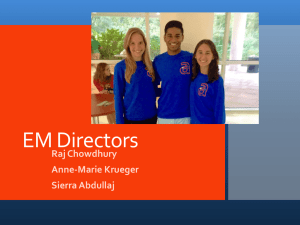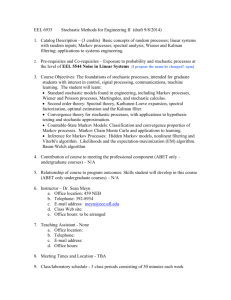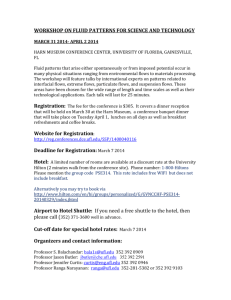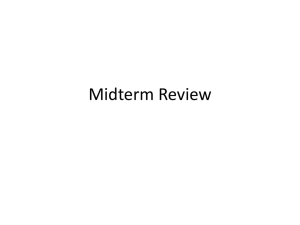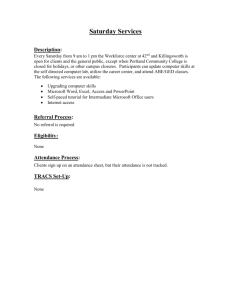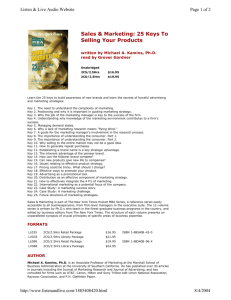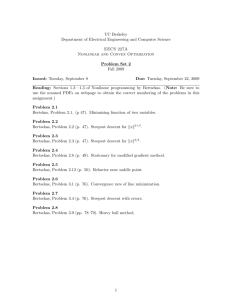Standardized Syllabus for the College of Engineering
advertisement
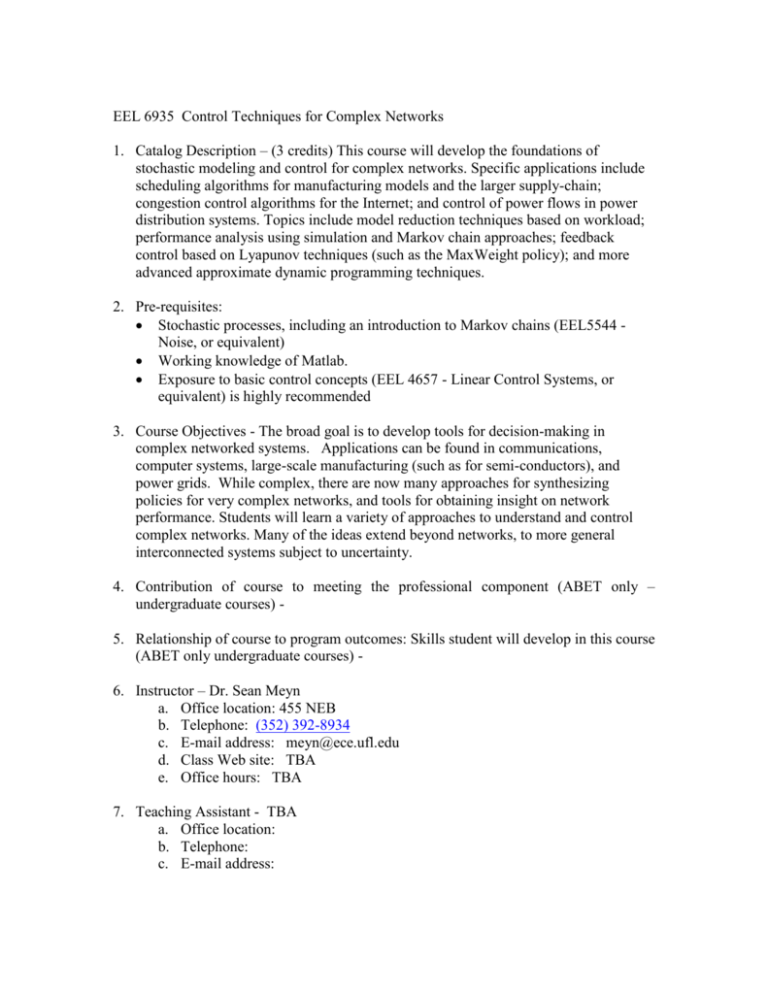
EEL 6935 Control Techniques for Complex Networks 1. Catalog Description – (3 credits) This course will develop the foundations of stochastic modeling and control for complex networks. Specific applications include scheduling algorithms for manufacturing models and the larger supply-chain; congestion control algorithms for the Internet; and control of power flows in power distribution systems. Topics include model reduction techniques based on workload; performance analysis using simulation and Markov chain approaches; feedback control based on Lyapunov techniques (such as the MaxWeight policy); and more advanced approximate dynamic programming techniques. 2. Pre-requisites: Stochastic processes, including an introduction to Markov chains (EEL5544 Noise, or equivalent) Working knowledge of Matlab. Exposure to basic control concepts (EEL 4657 - Linear Control Systems, or equivalent) is highly recommended 3. Course Objectives - The broad goal is to develop tools for decision-making in complex networked systems. Applications can be found in communications, computer systems, large-scale manufacturing (such as for semi-conductors), and power grids. While complex, there are now many approaches for synthesizing policies for very complex networks, and tools for obtaining insight on network performance. Students will learn a variety of approaches to understand and control complex networks. Many of the ideas extend beyond networks, to more general interconnected systems subject to uncertainty. 4. Contribution of course to meeting the professional component (ABET only – undergraduate courses) 5. Relationship of course to program outcomes: Skills student will develop in this course (ABET only undergraduate courses) 6. Instructor – Dr. Sean Meyn a. Office location: 455 NEB b. Telephone: (352) 392-8934 c. E-mail address: meyn@ece.ufl.edu d. Class Web site: TBA e. Office hours: TBA 7. Teaching Assistant - TBA a. Office location: b. Telephone: c. E-mail address: d. Office hours: 8. Meeting Times – 9. Class schedule - 2 class periods consisting of 80 minutes each 10. Meeting Location – 11. Material and Supply Fees - None 12. Textbooks and Software Required – a. Title: Control Techniques for Complex Networks b. Author: S. P. Meyn c. Publication date and edition: Cambridge University Press, 2007 d. ISBN number: 13. Recommended Reading – In addition to course handouts posted on the course website: a. Title: Markov chains and stochastic stability b. Author: S. P. Meyn and R. L. Tweedie c. Publication date and edition: Cambridge University Press, 2nd edition, 2009 d. ISBN number: a. Title: Resource Allocation and Cross-Layer Control in Wireless Networks b. Author: L. Geogiadis, M. J. Neely, and L. Tassiulas c. Publication date and edition: Foundations and Trends in Networking Vol. 1, no. 1, pp. 1-144, 2006 d. ISBN number: a. b. c. d. Title: Dynamic Programming and Optimal Control, Volume I Author: Dimitri P. Bertsekas Publication date and edition: 3RD EDITION, 2005 ISBN number: a. b. c. d. Title: Dynamic Programming and Optimal Control, Volume II Author: Dimitri P. Bertsekas Publication date and edition: 3RD EDITION, 2007 ISBN number: 14. Course Outline (provide topics covered by week or by class period) – Network Models Introduction to queueing and flow models; examples from flexible manufacturing, telecommunications, and power distribution systems (3hrs) The single queue: Little’s Theorem, Pollaczek-Khincine, M/G/1, G/G/1 and workload. Dynamic network models and sources of instability. (4.5hrs) Markov modeling. Stability theory based on Lyapunov and fluid-limit criteria. Coupling, ergodicity, and simulation. (6hrs) Control Techniques Myopic policies, MaxWeight policies and generalizations (4.5hrs) Control approaches based on safety-stocks and hedging points, generalizing the inventory theory of Clark & Scarf. (4.5hrs) Dynamic programming for networks and fluid model approximations (6hrs) Workload Relaxation Workload relaxation techniques, and related approximation theory; its relationship to heavy-traffic theory and singular perturbations. Policy synthesis based on relaxations. Hedging in complex networks. Applications in communication, manufacturing, and the power grid. (9hrs) 15. Attendance and Expectations - Cell phones and other electronic devices are to be silenced. No text messaging during class or exams. Requirements for class attendance and make-up exams, assignments, and other work are consistent with university policies that can be found at: https://catalog.ufl.edu/ugrad/current/regulations/info/attendance.aspx 16. Grading 20% - Bi-weekly homework assignments 40% - Midterm exams 40% - Project 17. Grading Scale – A A- B+ B B- C+ C C- D+ D D- E 93-100 90-92 87-89 83-86 80-82 77-79 73-76 70-72 67-69 63-66 60-62 0-59 In order to graduate, graduate students must have an overall GPA and an upperdivision GPA of 3.0 or better (B or better). Note: a B- average is equivalent to a GPA of 2.67, and therefore, it does not satisfy this graduation requirement. For more information on grades and grading policies, please visit: http://gradschool.ufl.edu/catalog/current-catalog/catalog-generalregulations.html#grades 18. Make-up Exam Policy – If you have a University-approved excuse and arrange for it in advance, or in case of documented emergency, a make-up exam will be allowed. For information on UF policies concerning attendance, please visit: https://catalog.ufl.edu/ugrad/current/regulations/info/attendance.aspx#absences 19. Honesty Policy – All students admitted to the University of Florida have signed a statement of academic honesty committing themselves to be honest in all academic work and understanding that failure to comply with this commitment will result in disciplinary action. This statement is a reminder to uphold your obligation as a UF student and to be honest in all work submitted and exams taken in this course and all others. 20. Accommodation for Students with Disabilities – Students Requesting classroom accommodation must first register with the Dean of Students Office. That office will provide the student with documentation that he/she must provide to the course instructor when requesting accommodation. 21. UF Counseling Services –Resources are available on-campus for students having personal problems or lacking clear career and academic goals. The resources include: · UF Counseling & Wellness Center, 3190 Radio Rd, 392-1575, psychological and psychiatric services. · Career Resource Center, Reitz Union, 392-1601, career and job search services. 22. Software Use – All faculty, staff and student of the University are required and expected to obey the laws and legal agreements governing software use. Failure to do so can lead to monetary damages and/or criminal penalties for the individual violator. Because such violations are also against University policies and rules, disciplinary action will be taken as appropriate. We, the members of the University of Florida community, pledge to uphold ourselves and our peers to the highest standards of honesty and integrity.
